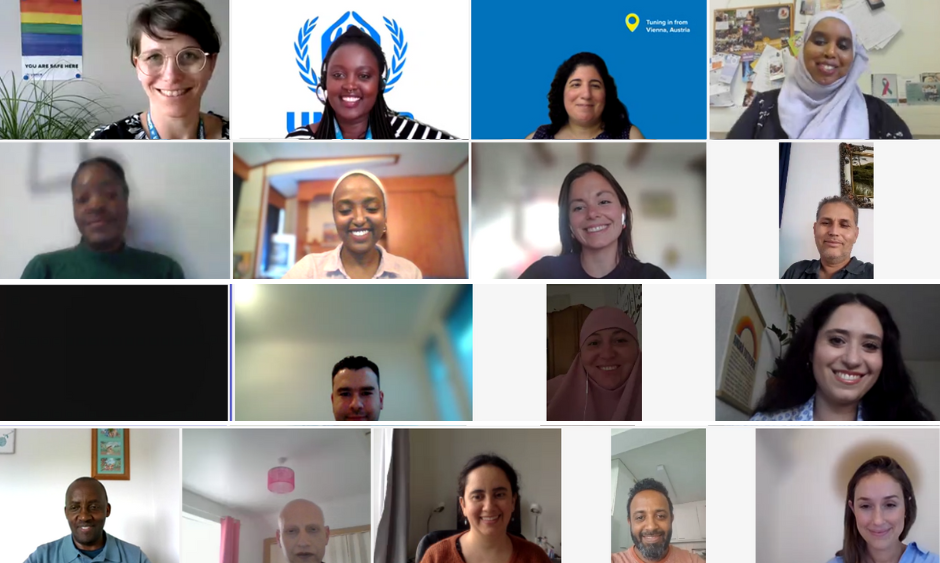Irish Red Cross to help reunite refugee families in Ireland
Irish Red Cross to help reunite refugee families in Ireland

DUBLIN, Ireland, February 15 (UNHCR) - The UN refugee agency in Ireland has signed its first agreement with the Irish Red Cross on coordination between the two agencies on family reunification for refugees, a process that is expected to accelerate amid the recent decline in asylum applications.
Until recently, the assessment of the financial needs of refugees applying for UNHCR-funded travel assistance was undertaken by the British Red Cross. Cooperation with the British Red Cross dated back to the time when refugee affairs for Ireland were covered by UNHCR's office in the United Kingdom.
With a fully-fledged UNHCR Representation in Dublin, this has now been transferred to the Irish Red Cross, which has a 50-year history of assisting refugees in Ireland, having first helped the reception of Hungarian refugees in 1956.
UNHCR's Representative in Ireland, Manuel Jordão, welcomed the Irish Red Cross's engagement in family reunification, which was formalised earlier this month. "For us, the Red Cross, with its humanitarian mandate and tracing activities, is a natural partner in the endeavour to reunite families," he said.
Secretary-General of the Irish Red Cross, Carmel Dunne, also hailed the partnership with UNHCR as important. "Taking on family reunion is a logical step in our ongoing service development," he said. "The Red Cross has an important role to play with the changing demographic profile of Irish society and family reunification complements our organisation's existing range of activities."
For now, UNHCR continues to fund family reunification for refugees in Ireland. However, Jordão said, "We hope in future that the Irish Government will not only generously grant family reunification, but also contribute some of the cost to assist families that cannot afford flight tickets, a task that currently falls to UNHCR."
In 2006, there were applications for 1,350 family reunions, of which over 360 were eventually granted visas to join family in Ireland. UNHCR contributed over US$15,000 towards helping refugees reunite in Ireland in 2005.
The refugee agency's involvement also included frequent requests to the International Committee of the Red Cross/Crescent (ICRC) for their assistance with ICRC temporary travel documents, when family members were unable to acquire national passports.
In recent years, the processing of family reunification cases has been considerably slow in Ireland, due to the high number of asylum applications which places demands on the Irish immigration and asylum systems.
Recent decreases in the numbers seeking asylum in Ireland, together with the establishment of the Irish Naturalisation and Immigration Service (INIS), have allowed the authorities here to prioritize the re-distribution of staff resources in the area of asylum and immigration with the aim of increasing output in areas with processing delays.
In 2006, Ireland witnessed a decrease in asylum numbers to the lowest in 10 years, with just 4,314 asylum applications received in 2006. It is a significant 63-percent decrease on 2002 when 11,634 applied. The top countries of origin were Nigeria, Sudan, Romania, Iraq and Iran.
With the downward trend in applications, INIS is set to give priority to other areas of its operations, such as processing applications for visas and citizenship which would include family reunification applications.
Other priorities include the enhancement of the deportation process for anyone found not to have a protection need.
Despite delays, UNHCR's Jordão believes that "Ireland has made a considerable effort to create an asylum system that is both practical and protection-oriented."
At present, the country does not give refugee status to family members of refugees already in the country. As a result, family members of refugees who live in Ireland must apply for family reunion in order to stay.
The UN refugee agency favours the granting of a derivative status to these family members, as it would be more efficient and lessen the processing burden in the area of family reunion in the Irish system.
By Steven O'Brien in Dublin, Ireland





